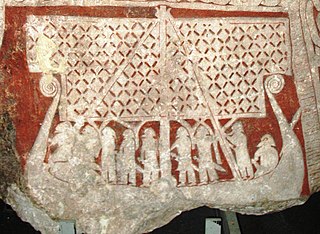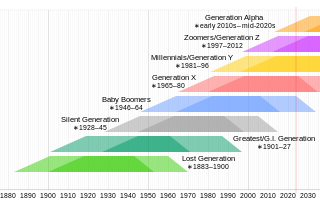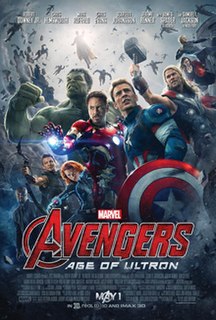Related Research Articles
The age of consent is the age at which a person is considered to be legally competent to consent to sexual acts. Consequently, an adult who engages in sexual activity with a person younger than the age of consent is unable to legally claim that the sexual activity was consensual, and such sexual activity may be considered child sexual abuse or statutory rape. The person below the minimum age is considered the victim, and their sex partner the offender, although some jurisdictions provide exceptions through "Romeo and Juliet laws" if both participants are underage. One purpose of setting an age of consent is to protect an underage person from sexual advances.

The Bronze Age is a historic period, approximately 3300 BCE to 1200 BCE, that was characterized by the use of bronze, in some areas proto-writing, and other early features of urban civilization. The Bronze Age is the second principal period of the three-age Stone-Bronze-Iron system, as proposed in 1836 by Christian Jürgensen Thomsen, for classifying and studying ancient societies and history.
The Iron Age is the final epoch of the three-age division of the prehistory and protohistory of humanity. It was preceded by the Stone Age and the Bronze Age. The concept has been mostly applied to Europe and the Ancient Near East, but also, by analogy, to other parts of the Old World.

In the history of Europe, the Middle Ages or medieval period lasted approximately from the 5th to the late 15th centuries, similarly to the post-classical period of global history. It began with the fall of the Western Roman Empire and transitioned into the Renaissance and the Age of Discovery. The Middle Ages is the middle period of the three traditional divisions of Western history: classical antiquity, the medieval period, and the modern period. The medieval period is itself subdivided into the Early, High, and Late Middle Ages.

New Age is a range of spiritual or religious practices and beliefs which rapidly grew in the Western world during the 1970s. Precise scholarly definitions of the New Age differ in their emphasis, largely as a result of its highly eclectic structure. Although analytically often considered to be religious, those involved in it typically prefer the designation of spiritual or Mind, Body, Spirit and rarely use the term New Age themselves. Many scholars of the subject refer to it as the New Age movement, although others contest this term and suggest that it is better seen as a milieu or zeitgeist.

The Renaissance is a period in European history marking the transition from the Middle Ages to modernity and covering the 15th and 16th centuries, characterized by an effort to revive and surpass ideas and achievements of classical antiquity. It occurred after the Crisis of the Late Middle Ages and was associated with great social change. In addition to the standard periodization, proponents of a "long Renaissance" may put its beginning in the 14th century and its end in the 17th century.

The Stone Age was a broad prehistoric period during which stone was widely used to make tools with an edge, a point, or a percussion surface. The period lasted for roughly 3.4 million years, and ended between 4,000 BCE and 2,000 BCE, with the advent of metalworking. Though some simple metalworking of malleable metals, particularly the use of gold and copper for purposes of ornamentation, was known in the Stone Age, it is the melting and smelting of copper that marks the end of the Stone Age. In Western Asia, this occurred by about 3,000 BCE, when bronze became widespread. The term Bronze Age is used to describe the period that followed the Stone Age, as well as to describe cultures that had developed techniques and technologies for working copper alloys into tools, supplanting stone in many uses.

Vikings is the modern name given to seafaring people primarily from Scandinavia, who from the late 8th to the late 11th centuries raided, pirated, traded and settled throughout parts of Europe. They also voyaged as far as the Mediterranean, North Africa, the Middle East, and North America. In some of the countries they raided and settled in, this period is popularly known as the Viking Age, and the term "Viking" also commonly includes the inhabitants of the Scandinavian homelands as a collective whole. The Vikings had a profound impact on the early medieval history of Scandinavia, the British Isles, France, Estonia, and Kievan Rus'.

Millennials, also known as Generation Y or Gen Y, are the demographic cohort following Generation X and preceding Generation Z. Researchers and popular media use the early 1980s as starting birth years and the mid-1990s to early 2000s as ending birth years, with the generation typically being defined as people born from 1981 to 1996. Most millennials are the children of baby boomers and early Gen Xers; millennials are often the parents of Generation Alpha.

Queens of the Stone Age is an American rock band formed in 1996 in Palm Desert, California. The band was founded by vocalist and guitarist Josh Homme, who has been the only constant member throughout multiple line-up changes. The current line-up consists of Homme alongside Troy Van Leeuwen, Michael Shuman, Dean Fertita, and Jon Theodore. The band also have a large pool of contributors and collaborators. Queens of the Stone Age are known for their blues, Krautrock and electronica-influenced style of riff-oriented and rhythmic hard rock music, coupled with Homme's distinct falsetto vocals and unorthodox guitar scales.

Longevity myths are traditions about long-lived people, either as individuals or groups of people, and practices that have been believed to confer longevity, but for which scientific evidence does not support the ages claimed or the reasons for the claims. While literal interpretations of such myths may appear to indicate extraordinarily long lifespans, many scholars believe such figures may be the result of incorrect translation of numbering systems through various languages coupled with the cultural and/or symbolic significance of certain numbers.

In United States history, the Gilded Age was an era that occurred during the late 19th century, from the 1870s to about 1900. The Gilded Age was an era of rapid economic growth, especially in the Northern and Western United States. As American wages grew much higher than those in Europe, especially for skilled workers, and industrialization demanded an ever-increasing unskilled labor force, the period saw an influx of millions of European immigrants. The rapid expansion of industrialization led to real wage growth of 60% between 1860 and 1890, and spread across the ever-increasing labor force. The average annual wage per industrial worker rose from $380 in 1880, to $564 in 1890, a gain of 48%. Conversely, the Gilded Age was also an era of abject poverty and inequality, as millions of immigrants—many from impoverished regions—poured into the United States, and the high concentration of wealth became more visible and contentious.

IMDb is an online database of information related to films, television series, home videos, video games, and streaming content online – including cast, production crew and personal biographies, plot summaries, trivia, ratings, and fan and critical reviews. IMDb began as a fan-operated movie database on the Usenet group "rec.arts.movies" in 1990, and moved to the web in 1993. It is now owned and operated by IMDb.com, Inc., a subsidiary of Amazon.
This is a list of tables of the oldest people in the world in ordinal ranks. To avoid including false or unconfirmed claims of old age, names here are restricted to those people whose ages have been validated by an international body dealing in longevity research, such as the Gerontology Research Group (GRG) or Guinness World Records (GWR), and others who have otherwise been reliably sourced.

Generation Z, colloquially also known as zoomers, is the demographic cohort succeeding Millennials and preceding Generation Alpha. Researchers and popular media use the mid-to-late 1990s as starting birth years and the early 2010s as ending birth years. Most members of Generation Z are children of Generation X.

Prehistory, also known as pre-literary history, is the period of human history between the use of the first stone tools by hominins c. 3.3 million years ago and the invention of writing systems. The use of symbols, marks, and images appears very early among humans, but the earliest known writing systems appeared c. 5000 years ago and it took thousands of years for writing systems to be widely adopted. In some human cultures, writing systems were not used until the nineteenth century and, in a few, are not even used until the present. The end of prehistory therefore came at very different dates in different places, and the term is less often used in discussing societies where prehistory ended relatively recently.

Ice Age is an American media franchise centering on a group of mammals surviving the Paleolithic ice age. It consists of computer-animated films, short films, TV specials and a series of video games. The first five films were produced by Blue Sky Studios. The series features the voices of Ray Romano, John Leguizamo, Denis Leary and Chris Wedge, who are the only constant cast members. Five films have been released in the series thus far: Ice Age in 2002, Ice Age: The Meltdown in 2006, Ice Age: Dawn of the Dinosaurs in 2009, Ice Age: Continental Drift in 2012, and Ice Age: Collision Course in 2016. As of April 2016, the franchise had generated $6 billion in revenue, making it one of the highest-grossing media franchises of all time.

Avengers: Age of Ultron is a 2015 American superhero film based on the Marvel Comics superhero team the Avengers. Produced by Marvel Studios and distributed by Walt Disney Studios Motion Pictures, it is the sequel to The Avengers (2012) and the 11th film in the Marvel Cinematic Universe (MCU). Written and directed by Joss Whedon, the film features an ensemble cast including Robert Downey Jr., Chris Hemsworth, Mark Ruffalo, Chris Evans, Scarlett Johansson, Jeremy Renner, Don Cheadle, Aaron Taylor-Johnson, Elizabeth Olsen, Paul Bettany, Cobie Smulders, Anthony Mackie, Hayley Atwell, Idris Elba, Stellan Skarsgård, James Spader, and Samuel L. Jackson. In the film, the Avengers fight Ultron, an artificial intelligence obsessed with causing human extinction.
The following notable deaths occurred in 2022. Names are reported under the date of death, in alphabetical order. A typical entry reports information in the following sequence:
References
- ↑ "GeoWhen Database". Archived from the original on 2007-10-12.